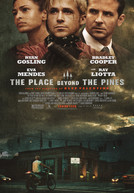The Place Beyond the Pines
MPAA Rating: RIn Theaters: March 29th, 2013
Runtime: 2 hours 20 minutes (140 minutes)
Rated R for language throughout, some violence, teen drug and alcohol use, and a sexual reference.
One
Of
The
Best!
The Place Beyond the Pines Review
- What's Good:
- The story telling, sure is a masterpiece.
- What's Bad:
- Very few stumbling acts.
- Verdict:
- This story has got the density and momentum to leave you grasping for the experience you haven't yet had.
- Watch or Not:
- Do watch this epic, you won't be disappointed!
Audience Ratings for The Place Beyond the Pines
Plot Summary
The Place Beyond the Pines is the new movie from the director of Blue Valentine. Luke (Ryan Gosling) is a motorcycle performer. While passing through Schenectady, NY, he learns that a former lover, Romina (Eva Mendes), has given birth to their son Jason. Luke decides to give up life on the road to try and provide for his newfound family. His employer Robin (Ben Mendelsohn) proposes to partner in a string of bank robberies – which will place Luke on the radar of ambitious rookie cop Avery Cross (Bradley Cooper). Avery, who has to navigate a police department ruled by corrupt detective Deluca (Ray Liotta), is also struggling to balance life with his wife Jennifer (Rose Byrne) and their infant son AJ. The consequences of Avery's confrontation with Luke reverberate into the next generation, when the two sons, Jason (Dane DeHaan) and AJ (Emory Cohen), must face their fateful, shared legacy.
Critics Reviews for The Place Beyond the Pines
59 Critics like this movie.
Reviews Counted: 22 | Positive Review: 13 | Negative Review: 9 | Average Rating: 3.2/5Perry's film lags and limps along its two-hour runtime before finally going whole hog on one of the most dizzyingly weird final acts in recent cinematic history.
Critic Score: 1.5/5
The movie is intimate in its telling, sweeping in its issues and stumbles only occasionally.
Critic Score: 3.5/5
Its ambitions - even its unrealized ones - are a great part of its power.
Critic Score: 3.5/4

Structured as a triptych, the movie is novelistic, earnest and somewhat exhausting - an ambitious effort that tries to be many things.
Each chapter of The Place Beyond the Pines gets successively less interesting than the last ...

For the most part ... this is self-serious stuff, seething with ambition but almost devoid of spontaneity, and ultimately drained of genuine energy.

If, in the end, the film can't quite sustain its epic vision, it does, along the way, achieve the density and momentum of a good novel.
Critic Score: 3/5

It's one of the best and most ambitious films of the year.
Critic Score: 3.5/4

[The Place Beyond The Pines] a beast of a movie, an emotional roller coaster that threatens to go off the rails, and does.
Critic Score: 3/4

This is a big movie with a lot on its mind. Slowly, it unfolds into a kind of epic.
Critic Score: 3.5/4

The movie, which holds your attention from moment to moment, by the end leaves you grasping for the experience you haven't had.
This emotionally ambitious mess has faults to spare, but there's also something fuzzily honest about it.
Critic Score: 3/5

Although The Place Beyond the Pines is not an unqualified success, when Cianfrance stumbles, it's because he's reaching for greatness ...
Critic Score: 3/4

An over-stuffed, hyper-pulpy, and mostly trite trifurcated drama about family, crime, and moral ambiguity.
Critic Score: 1.5/4
The Place Beyond the Pines wants to be a deep-dish meditation on fathers, sons, and the consequences of the decisions we make. But it's a slow-burner that burns so slowly its wick completely fizzles out.
Critic Score: C
Mr. Cianfrance's artistic vision catapults it above the limitations of contrivance and into a realm of constantly evolving shifts of tone and mood.
''The Place Beyond the Pines'' aims admirably for an epic sense of Greek tragedy, and it does have some powerful individual moments, but the characters are all so underdeveloped that the whole effort feels like studied posturing.
Critic Score: 2/4

The movie looks great throughout, blending action, urban drama and family melodrama with a dark, thrumming undertone that holds them together.

Sure to inspire indifference and cultish admiration in nearly equal measure, this extravagant mess may someday be re-evaluated as a misunderstood masterpiece.
We're too close to Drive to see this performance as anything special, but when Suicide's "Che" churns to life on the soundtrack and Gosling peels out, there are thrills to be had.
Critic Score: 3/5
A somber and striking drama that takes some wrong turns but features a charismatic performance from Ryan Gosling in the leanest and best of its three sections.
The segments are essentially monodramas, so sketchily written that the big moments feel less like recognizable human behavior than recognizable screenwriter overreaching.

Your Reaction to The Place Beyond the Pines ?
Credits
©2013 Focus Features

